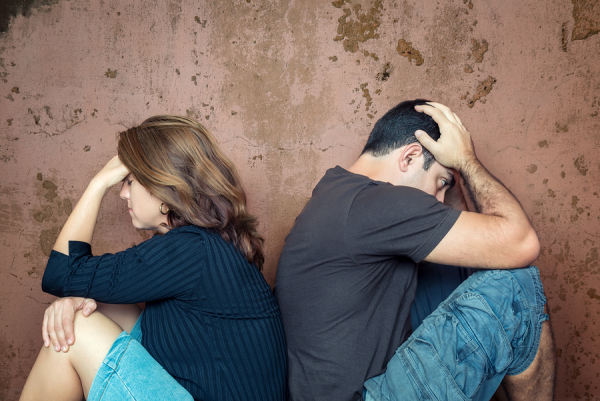
Divorce is only second to the death of a spouse on the stress scale of adult life events. It disrupts a person's finances, living arrangements, personal relationships, schedules, and parenting access, among many other aspects of day-to-day living. This disruption can last several months or go on for years. The chaos and stress of going through a divorce along with the aftermath of one can adversely affect a man's health.
How can divorce affect your health?
When it comes to divorce, stress is a given. The stress can become chronic, which can affect all aspects of your health. One thing to remember is that you cannot disconnect the mental, physical, and emotional aspects of your health. If one aspect suffers, the rest will also. So, the emotional upheaval of a divorce is going to have an impact on your mental and physical health as well.
Here are some common health issues a man can face while going through a divorce:
- Depression and anxiety often affect a divorcing man's mental health. This can wreak havoc on emotional stability, focus and concentration, as well as causing physical symptoms like high blood pressure and heart disease.
- Overuse of alcohol, recreational drugs, or prescription medications is an easy way to escape the stresses of divorce. These can lead to physical, mental, and physical dependency.
- Lack of motivation can make it difficult to get out of bed in the morning. This makes it difficult to go to work or school. It can make it impossible to eat a healthy diet or get out and exercise.
- A weakened immune system is a natural result of dealing with too much stress. Cortisol released by the body during stressful times suppresses the immune system's ability to handle common infections, which, in turn, leads to more colds and common illnesses.
- Weight gain is par for the course for many men going through a divorce. Stress causes the body to store fat when it would otherwise burn it. Some people also tend to overeat when stressed, which only adds to weight gain. With motivation issues, lack of exercise is a problem.
- Troubled sleep is common with people going through the emotional ups and downs of divorce. Tossing and turning becomes a common way to spend the night. Sleeplessness also adds to stress levels which only makes sleeping problems worse.
- Many men going through a divorce also deal with an identity crisis. Divorce is a struggle of trying to figure out who you are without your spouse. This adds to the physical and emotional symptoms of chronic stress.
- Digestive issues are tied directly to stress levels. Acute, one-time stress can lead to an upset digestive system. Chronic, on-going stress can cause problems like heartburn, indigestion, and irritable bowel syndrome.
How can you manage these issues?
Without careful monitoring and management, a man's health can suffer during and after a divorce. Fortunately, there are plenty of things you can do to counter these factors and to stay healthy during this emotionally challenging and stressful time.
- Make sure to eat a healthy mix of foods and in regular portions. Many divorcing men either have no appetite or want to overeat the wrong foods. Even if you are not hungry, it is important to eat healthy foods at regular intervals. Indulging occasionally in comfort foods is okay, but you should not make it the norm. Good nutrition helps to stabilize the body's immune and digestive systems, along with giving you the energy you need.
- Schedule time throughout the week for exercise. Exercise does a couple of things. It helps you work out stress as well as burning calories and improving your health. Exercising with a friend will help keep you motivated and help you get out of social isolation.
- Relax. Give yourself permission to relax and let go of the stress, even for a short time. Take up yoga or meditation. Get out with your friends for a fun evening. Listen to music. Take a walk. Take a nap.
- Get a check-up and talk with your doctor. Your doctor may want to watch your health closer during the divorce transition. A check-up will show if you are having health issues and let you proactively manage them. It is also the perfect time to talk with your doctor about any sleep issues you might be having.
- Tap into your support network. If you don't have one, build one. Make contact with your friends and see if they want to go out. Take time to visit with your parents and siblings. Seek out a group for men going through a divorce. Sometimes it is helpful to talk to others going through the same experience.
- Get counseling or therapy if you need it. There is nothing wrong with getting help. Talking with a professional can help you process emotions in a healthy way. It can also help you manage and reduce depression and anxiety.
- Talk with HR at your place of employment about the situation. They can help you work through any work-related issues you may face during this transition. They may also be able to connect you with counselors and other professionals who can help you.
A divorce is never easy. The stress it brings can play havoc with a man's health. Taking a proactive stance to monitoring and managing that stress will lead to better mental, physical and emotional health through the transition.



